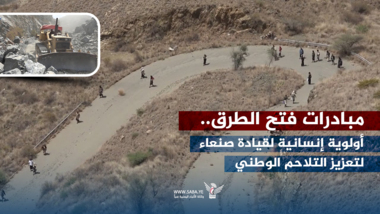Sana'a - Saba:
The Revolutionary Leadership and the Supreme Political Council have placed road opening among their national and humanitarian priorities, based on their deep awareness of the daily suffering caused by closed roads to citizens, in light of the ongoing US-Saudi-Emirati aggression and blockade of the country.
This concern has been evident in the successive initiatives launched by the Sana'a leadership, affirming its commitment to its moral and humanitarian responsibilities and embodying the goals of the September 21 Revolution, which aim to strengthen national cohesion and alleviate the suffering of citizens.
Sana'a has pursued its revolutionary and liberation approach with awareness and responsibility, engaging with every initiative that would alleviate the suffering of citizens and improve their livelihoods, this comes at a time when the aggression coalition has been lurking in Yemen for decades, an extension of the era of British colonialism that extended its hegemony over the south of the country for approximately 129 years, during which it entrenched a policy of "divide and rule," dividing the nation into rival sheikhdoms and sultanates.
The effects and repercussions of the aggression have multiplied, affecting various sectors, including depriving citizens of freedom of movement and communication through road closures and the targeting of travelers, either by enemy airstrikes or by banditry and looting gangs unleashed by the coalition on roads connecting governorates.
Recognizing the vitality of this issue, the Sana'a leadership has presented a series of initiatives to open closed roads, believing in the importance of strengthening ties between Yemenis and facilitating freedom of movement between cities and regions, this is especially true since the closures were not limited to the north-south lines, but extended to include the interior districts and regions, exacerbating the daily suffering of citizens.
The Sana'a leadership did not limit itself to the announced initiatives, but rather initiated their unilateral implementation on the ground, as a demonstration of good faith and a pretext for argument. However, the other side did not respond to these initiatives, given that the decision to open or close the road remained subject to the will of the Saudi and Emirati occupiers, who have transgressed all boundaries of neighborliness and Islamic and humanitarian values by launching a bloody aggression against a Muslim neighbor.
Despite the repeated procrastination of the coalition's tools and mercenaries, and their continued rejection of road opening initiatives, the Sana'a leadership continued its humanitarian efforts with determination and national responsibility, these efforts resulted in the opening of several vital roads, including the Sana'a-Sirwah-Ma'rib Road, the Al-Bayda-Al-Jawba-Ma'rib City Road, the Al-Hawban-Qasr Al-Shaab-Al-Kamb Road, the Sana'a-Aden Road via Al-Dhale' Governorate, and finally the Aqabat Al-Mahalhal Road, linking the Abyan and Al-Bayda Governorates, this road was opened unilaterally, embodying the leadership's approach to alleviating the suffering of citizens and strengthening communication among the people of the nation.
The road-opening initiatives would not have been possible without the Sana'a leadership's seriousness in addressing the repercussions of the aggression and blockade, despite the rifts created within the social fabric by the US-Saudi-Emirati coalition, in a desperate attempt to reproduce projects of hegemony and division.
Despite this, the revolutionary leadership and the Supreme Political Council have been keen to overcome these challenges through a series of measures and steps, most notably the opening of internal and external roads, this will facilitate movement and trade, strengthen popular cohesion, and counter the attempts at division practiced by the occupying authorities in some governorates through regional division and identity discrimination.
Opening roads between governorates is not merely a service-oriented measure; it is a fundamental right of Yemenis to freedom of movement, communication, and visitation, it contributes to protecting them from acts of banditry, kidnappings, and assassinations carried out by criminal gangs and armed militias loyal to the Saudi-Emirati aggression coalition in the occupied governorates, as part of colonial agendas seeking to destabilize security and impose a reality of chaos and division.
The road-opening initiatives adopted by the Sana'a leadership were merely an extension of a steadfast humanitarian stance, a victory for the values of brotherhood and unity, and a rejection of all forms of fragmentation and division sought by the occupier and its tools. While the forces of aggression continue to obstruct every initiative that alleviates the suffering of the Yemeni people, the Sana'a government continues to present a responsible national model, with the spirit of the state, the morals of the revolution, and a firm stance.
M.M

| more of (Reports) |




